Accounting Management Report: IFRS and Financial Reporting
VerifiedAdded on 2021/04/08
|5
|1117
|87
Report
AI Summary
This report delves into the benefits of International Accounting Standards (IAS) and International Financial Reporting Standards (IFRS), highlighting increased comparability, reduced costs for multinational firms, and improved reliability of financial reports. It then evaluates various models of financial reporting and auditing, exploring the varying degrees of IFRS compliance across organizations globally, and identifying factors impacting compliance, such as legal rules, economic development, and societal objectives. The report also critically assesses the performance and position of J Sainsbury PLC, incorporating and interpreting accounting ratios, using vertical and horizontal analysis, and comparing it to industry averages, providing a comprehensive analysis for group members. The report includes analysis of compliance rates in different countries like Egypt, Ghana, Turkey, and China and discusses the pressure faced by developing countries in adopting IFRS.
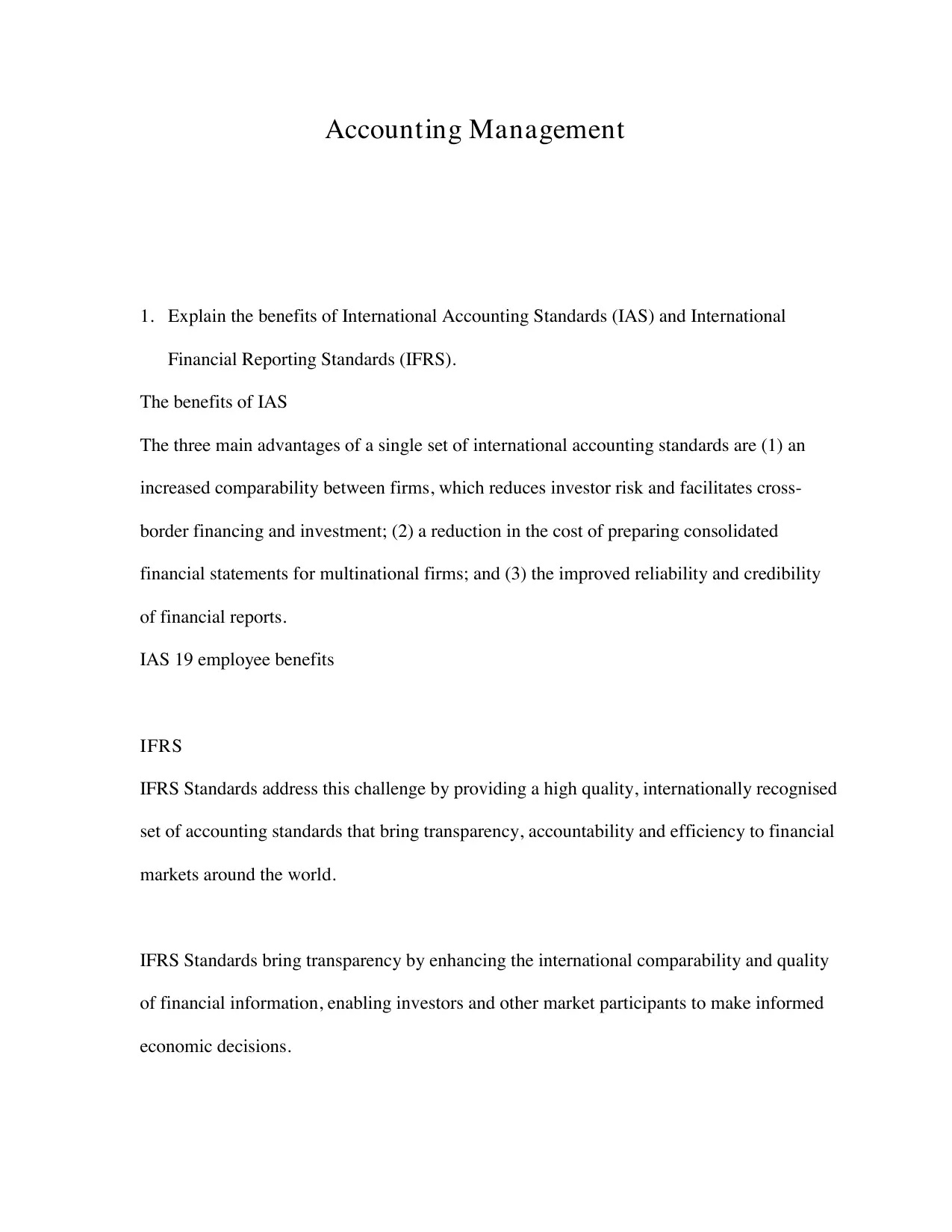
Accounting Management
1. Explain the benefits of International Accounting Standards (IAS) and International
Financial Reporting Standards (IFRS).
The benefits of IAS
The three main advantages of a single set of international accounting standards are (1) an
increased comparability between firms, which reduces investor risk and facilitates cross-
border financing and investment; (2) a reduction in the cost of preparing consolidated
financial statements for multinational firms; and (3) the improved reliability and credibility
of financial reports.
IAS 19 employee benefits
IFRS
IFRS Standards address this challenge by providing a high quality, internationally recognised
set of accounting standards that bring transparency, accountability and efficiency to financial
markets around the world.
IFRS Standards bring transparency by enhancing the international comparability and quality
of financial information, enabling investors and other market participants to make informed
economic decisions.
1. Explain the benefits of International Accounting Standards (IAS) and International
Financial Reporting Standards (IFRS).
The benefits of IAS
The three main advantages of a single set of international accounting standards are (1) an
increased comparability between firms, which reduces investor risk and facilitates cross-
border financing and investment; (2) a reduction in the cost of preparing consolidated
financial statements for multinational firms; and (3) the improved reliability and credibility
of financial reports.
IAS 19 employee benefits
IFRS
IFRS Standards address this challenge by providing a high quality, internationally recognised
set of accounting standards that bring transparency, accountability and efficiency to financial
markets around the world.
IFRS Standards bring transparency by enhancing the international comparability and quality
of financial information, enabling investors and other market participants to make informed
economic decisions.
Paraphrase This Document
Need a fresh take? Get an instant paraphrase of this document with our AI Paraphraser
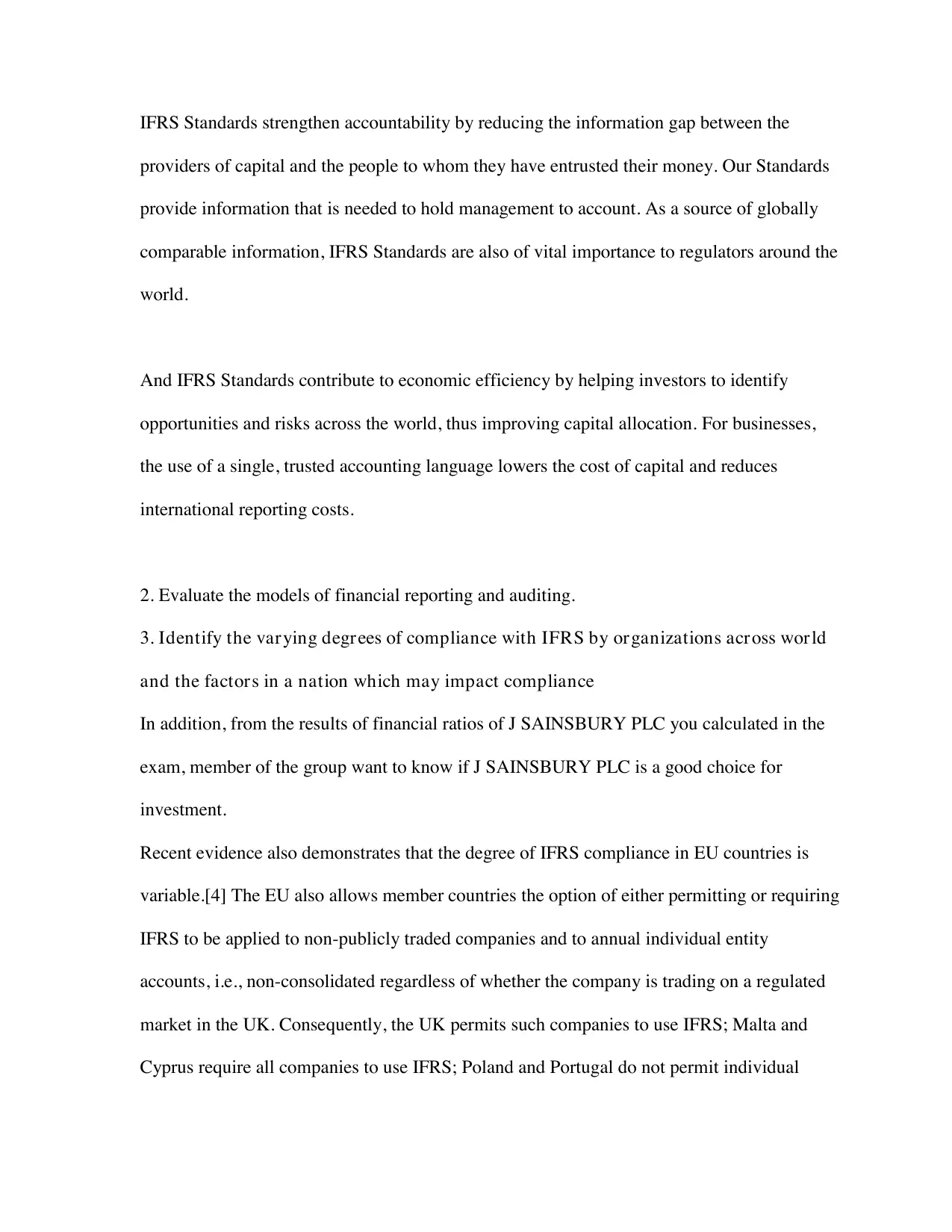
IFRS Standards strengthen accountability by reducing the information gap between the
providers of capital and the people to whom they have entrusted their money. Our Standards
provide information that is needed to hold management to account. As a source of globally
comparable information, IFRS Standards are also of vital importance to regulators around the
world.
And IFRS Standards contribute to economic efficiency by helping investors to identify
opportunities and risks across the world, thus improving capital allocation. For businesses,
the use of a single, trusted accounting language lowers the cost of capital and reduces
international reporting costs.
2. Evaluate the models of financial reporting and auditing.
3. Identify the varying degrees of compliance with IFRS by organizations across world
and the factors in a nation which may impact compliance
In addition, from the results of financial ratios of J SAINSBURY PLC you calculated in the
exam, member of the group want to know if J SAINSBURY PLC is a good choice for
investment.
Recent evidence also demonstrates that the degree of IFRS compliance in EU countries is
variable.[4] The EU also allows member countries the option of either permitting or requiring
IFRS to be applied to non-publicly traded companies and to annual individual entity
accounts, i.e., non-consolidated regardless of whether the company is trading on a regulated
market in the UK. Consequently, the UK permits such companies to use IFRS; Malta and
Cyprus require all companies to use IFRS; Poland and Portugal do not permit individual
providers of capital and the people to whom they have entrusted their money. Our Standards
provide information that is needed to hold management to account. As a source of globally
comparable information, IFRS Standards are also of vital importance to regulators around the
world.
And IFRS Standards contribute to economic efficiency by helping investors to identify
opportunities and risks across the world, thus improving capital allocation. For businesses,
the use of a single, trusted accounting language lowers the cost of capital and reduces
international reporting costs.
2. Evaluate the models of financial reporting and auditing.
3. Identify the varying degrees of compliance with IFRS by organizations across world
and the factors in a nation which may impact compliance
In addition, from the results of financial ratios of J SAINSBURY PLC you calculated in the
exam, member of the group want to know if J SAINSBURY PLC is a good choice for
investment.
Recent evidence also demonstrates that the degree of IFRS compliance in EU countries is
variable.[4] The EU also allows member countries the option of either permitting or requiring
IFRS to be applied to non-publicly traded companies and to annual individual entity
accounts, i.e., non-consolidated regardless of whether the company is trading on a regulated
market in the UK. Consequently, the UK permits such companies to use IFRS; Malta and
Cyprus require all companies to use IFRS; Poland and Portugal do not permit individual
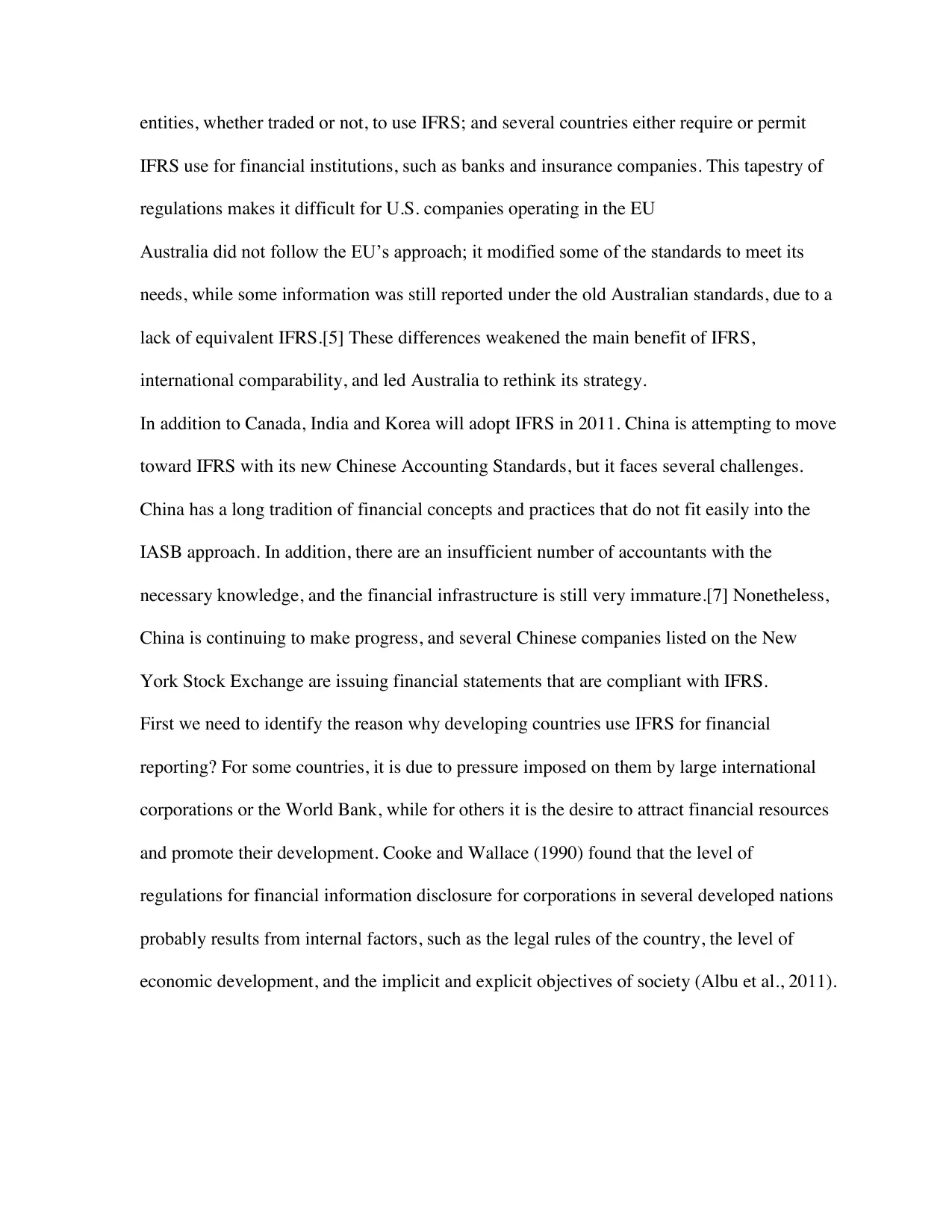
entities, whether traded or not, to use IFRS; and several countries either require or permit
IFRS use for financial institutions, such as banks and insurance companies. This tapestry of
regulations makes it difficult for U.S. companies operating in the EU
Australia did not follow the EU’s approach; it modified some of the standards to meet its
needs, while some information was still reported under the old Australian standards, due to a
lack of equivalent IFRS.[5] These differences weakened the main benefit of IFRS,
international comparability, and led Australia to rethink its strategy.
In addition to Canada, India and Korea will adopt IFRS in 2011. China is attempting to move
toward IFRS with its new Chinese Accounting Standards, but it faces several challenges.
China has a long tradition of financial concepts and practices that do not fit easily into the
IASB approach. In addition, there are an insufficient number of accountants with the
necessary knowledge, and the financial infrastructure is still very immature.[7] Nonetheless,
China is continuing to make progress, and several Chinese companies listed on the New
York Stock Exchange are issuing financial statements that are compliant with IFRS.
First we need to identify the reason why developing countries use IFRS for financial
reporting? For some countries, it is due to pressure imposed on them by large international
corporations or the World Bank, while for others it is the desire to attract financial resources
and promote their development. Cooke and Wallace (1990) found that the level of
regulations for financial information disclosure for corporations in several developed nations
probably results from internal factors, such as the legal rules of the country, the level of
economic development, and the implicit and explicit objectives of society (Albu et al., 2011).
IFRS use for financial institutions, such as banks and insurance companies. This tapestry of
regulations makes it difficult for U.S. companies operating in the EU
Australia did not follow the EU’s approach; it modified some of the standards to meet its
needs, while some information was still reported under the old Australian standards, due to a
lack of equivalent IFRS.[5] These differences weakened the main benefit of IFRS,
international comparability, and led Australia to rethink its strategy.
In addition to Canada, India and Korea will adopt IFRS in 2011. China is attempting to move
toward IFRS with its new Chinese Accounting Standards, but it faces several challenges.
China has a long tradition of financial concepts and practices that do not fit easily into the
IASB approach. In addition, there are an insufficient number of accountants with the
necessary knowledge, and the financial infrastructure is still very immature.[7] Nonetheless,
China is continuing to make progress, and several Chinese companies listed on the New
York Stock Exchange are issuing financial statements that are compliant with IFRS.
First we need to identify the reason why developing countries use IFRS for financial
reporting? For some countries, it is due to pressure imposed on them by large international
corporations or the World Bank, while for others it is the desire to attract financial resources
and promote their development. Cooke and Wallace (1990) found that the level of
regulations for financial information disclosure for corporations in several developed nations
probably results from internal factors, such as the legal rules of the country, the level of
economic development, and the implicit and explicit objectives of society (Albu et al., 2011).
⊘ This is a preview!⊘
Do you want full access?
Subscribe today to unlock all pages.

Trusted by 1+ million students worldwide
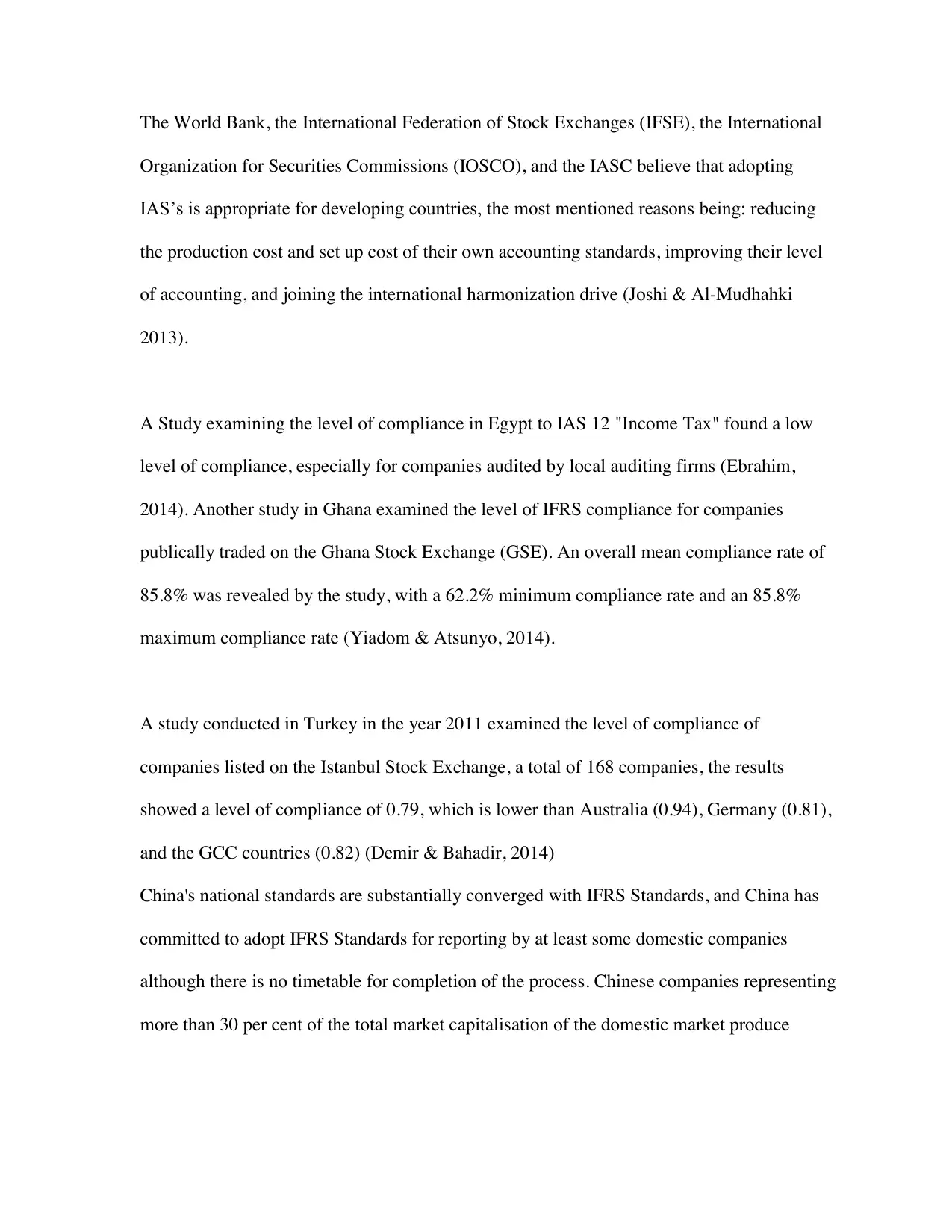
The World Bank, the International Federation of Stock Exchanges (IFSE), the International
Organization for Securities Commissions (IOSCO), and the IASC believe that adopting
IAS’s is appropriate for developing countries, the most mentioned reasons being: reducing
the production cost and set up cost of their own accounting standards, improving their level
of accounting, and joining the international harmonization drive (Joshi & Al-Mudhahki
2013).
A Study examining the level of compliance in Egypt to IAS 12 "Income Tax" found a low
level of compliance, especially for companies audited by local auditing firms (Ebrahim,
2014). Another study in Ghana examined the level of IFRS compliance for companies
publically traded on the Ghana Stock Exchange (GSE). An overall mean compliance rate of
85.8% was revealed by the study, with a 62.2% minimum compliance rate and an 85.8%
maximum compliance rate (Yiadom & Atsunyo, 2014).
A study conducted in Turkey in the year 2011 examined the level of compliance of
companies listed on the Istanbul Stock Exchange, a total of 168 companies, the results
showed a level of compliance of 0.79, which is lower than Australia (0.94), Germany (0.81),
and the GCC countries (0.82) (Demir & Bahadir, 2014)
China's national standards are substantially converged with IFRS Standards, and China has
committed to adopt IFRS Standards for reporting by at least some domestic companies
although there is no timetable for completion of the process. Chinese companies representing
more than 30 per cent of the total market capitalisation of the domestic market produce
Organization for Securities Commissions (IOSCO), and the IASC believe that adopting
IAS’s is appropriate for developing countries, the most mentioned reasons being: reducing
the production cost and set up cost of their own accounting standards, improving their level
of accounting, and joining the international harmonization drive (Joshi & Al-Mudhahki
2013).
A Study examining the level of compliance in Egypt to IAS 12 "Income Tax" found a low
level of compliance, especially for companies audited by local auditing firms (Ebrahim,
2014). Another study in Ghana examined the level of IFRS compliance for companies
publically traded on the Ghana Stock Exchange (GSE). An overall mean compliance rate of
85.8% was revealed by the study, with a 62.2% minimum compliance rate and an 85.8%
maximum compliance rate (Yiadom & Atsunyo, 2014).
A study conducted in Turkey in the year 2011 examined the level of compliance of
companies listed on the Istanbul Stock Exchange, a total of 168 companies, the results
showed a level of compliance of 0.79, which is lower than Australia (0.94), Germany (0.81),
and the GCC countries (0.82) (Demir & Bahadir, 2014)
China's national standards are substantially converged with IFRS Standards, and China has
committed to adopt IFRS Standards for reporting by at least some domestic companies
although there is no timetable for completion of the process. Chinese companies representing
more than 30 per cent of the total market capitalisation of the domestic market produce
Paraphrase This Document
Need a fresh take? Get an instant paraphrase of this document with our AI Paraphraser
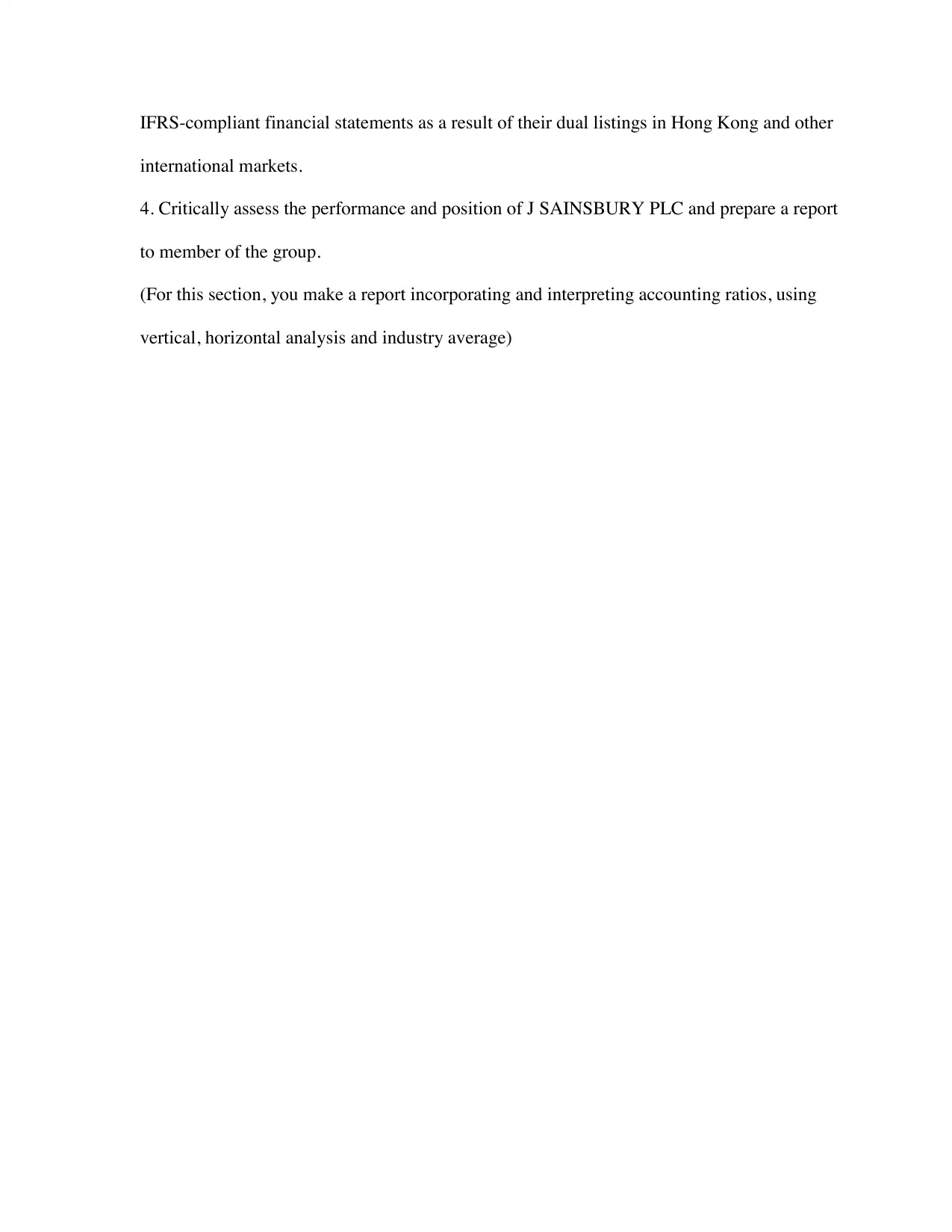
IFRS-compliant financial statements as a result of their dual listings in Hong Kong and other
international markets.
4. Critically assess the performance and position of J SAINSBURY PLC and prepare a report
to member of the group.
(For this section, you make a report incorporating and interpreting accounting ratios, using
vertical, horizontal analysis and industry average)
international markets.
4. Critically assess the performance and position of J SAINSBURY PLC and prepare a report
to member of the group.
(For this section, you make a report incorporating and interpreting accounting ratios, using
vertical, horizontal analysis and industry average)
1 out of 5
Related Documents
Your All-in-One AI-Powered Toolkit for Academic Success.
+13062052269
info@desklib.com
Available 24*7 on WhatsApp / Email
![[object Object]](/_next/static/media/star-bottom.7253800d.svg)
Unlock your academic potential
Copyright © 2020–2026 A2Z Services. All Rights Reserved. Developed and managed by ZUCOL.





